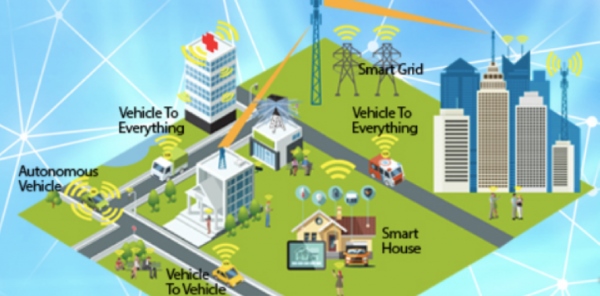
Published
by Rogers Corporation
Advanced Electronics Solutions
By 2020, experts project that 50 billion connected devices will be in use globally. The Internet of Things (IoT), smart homes, connected cars, fitness monitors and other emerging technologies are increasingly relying on global wireless networks to connect.
Advanced Materials in 5G and the IoT
Fifth Generation (5G) networks demand greater material performance to support these IoT devices. Rogers’ diverse portfolio of high frequency, high performance materials enable these complex 5G technologies that create our mobile networks, including antennas, backhaul radios and power amplifiers. And our R&D teams are collaborating every day with design engineers to develop additional unique material solutions for 5G technology.
5G is pushing the limit of Printed Circuit Board (PCB) designs including antennas, control functions and amplifier circuits. PCB attributes such as copper surface roughness, Dk variations, thermal dissipation, passive intermodulation, coefficient of thermal expansion and thickness variations affect 5G designs more than previous generations.
5G: Higher Frequencies
Next-gen 5G wireless networks promise more capacity and capability than 4G LTE systems, using wider channel bandwidths, new antenna and modulation technologies and higher carrier frequencies even through millimeter wave frequencies.
The transition to 5G will require the widespread use of higher, millimeter-wave frequency of 28 GHz and above. Evolving 5G infrastructure will depend on low-loss circuit materials engineered for these high frequencies.
Our new RO4835T™ laminates and RO4450T™ bonding materials are well suited for millimeter-wave frequencies as part of the inner core of 5G hybrid multilayer PCBs. They work well with other materials to provide the many functions needed by 5G wireless base stations, including power, signal control and signal transfers.
5G Resources for Design Engineers
Meeting the demands of evolving 5G infrastructure, engineers need to address the right balance of material performance and cost.
For engineers and manufacturers, we created online educational resources about material considerations for 5G designs. You can access technical information and helpful videos on our 5G resources page.
Our Road to 5G videos offer quick and easy ways to learn how to specify PCB materials for 5G to get ready for this next revolution in wireless communications.
Other Resources
- Advanced Materials for Internet of Things
- eBook: Selection of PCB Materials for 5G
- Rogers Technology Support Hub
Stay connected with our team and learn more about 5G technology by subscribing to our Tech Support Hub.
Tags:
5G, Wireless Infrastructure
Published on May 11, 2018

